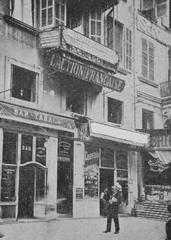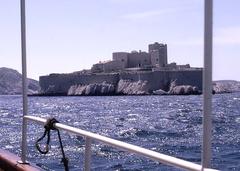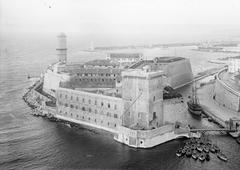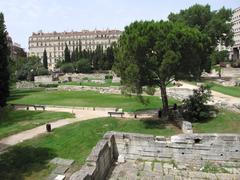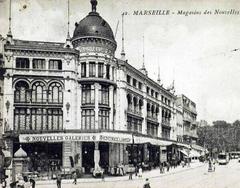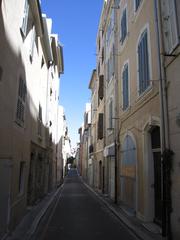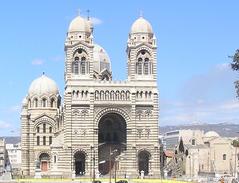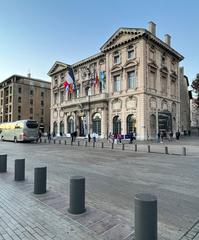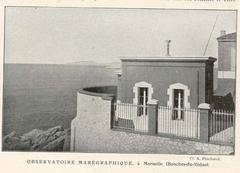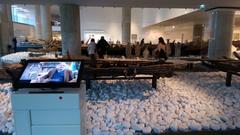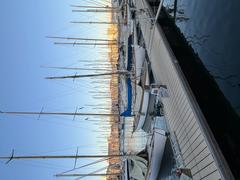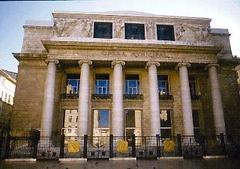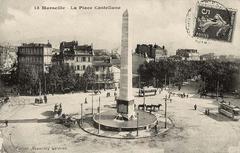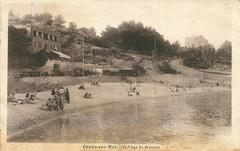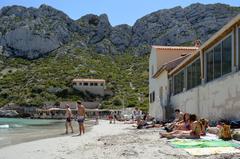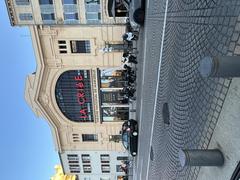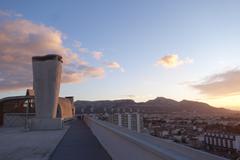Les Docks Marseille: Visiting Hours, Tickets, and Historical Site Guide
Date: 04/07/2025
Introduction
Les Docks Marseille stands as a symbol of Marseille’s rich maritime and industrial heritage, offering a unique blend of history, architecture, commerce, and contemporary urban life. Originally built in the 19th century to accommodate the city’s booming international trade, the Docks have been transformed into a dynamic hub of shopping, dining, business, and culture. Situated in the Joliette district and revitalized as part of the ambitious Euroméditerranée project, Les Docks is today an essential stop for visitors eager to experience both Marseille’s storied past and its vibrant present (marseille.fr; tarpin-bien.com; metropolismag.com).
This comprehensive guide details the history, architectural significance, visitor information, accessibility, nearby attractions, and practical tips for making the most of your visit to Les Docks Marseille.
Table of Contents
- Origins and Construction
- Architectural Innovations
- Economic and Cultural Importance
- Decline and Redevelopment
- Modern-Day Les Docks Village
- Visiting Information
- Events & Cultural Activities
- Shopping & Dining
- Guided Tours & Photo Opportunities
- Facilities & Amenities
- Nearby Attractions
- Frequently Asked Questions (FAQ)
- Summary & Final Tips
- References
Origins and Construction
Les Docks Marseille were conceived during the mid-19th century, a period of rapid economic growth for the city. With the Vieux-Port unable to handle the surge in maritime trade, the Bassin de la Joliette was inaugurated in 1853, and construction of Les Docks began soon after. The city reclaimed over 10 hectares of land—previously a quarantine station—entrusting the project to Paulin Talabot and the Compagnie des Docks et Entrepôts, which held a 99-year lease (tarpin-bien.com; lesdocks-marseille.com).
Architectural Innovations
Between 1858 and 1864, architect Gustave Desplaces designed Les Docks, drawing inspiration from the London docks. The main building is 365 meters long (symbolizing days of the year), with 52 doors (weeks), 7 levels (days), and 4 courtyards (seasons). The structure is composed of stone, brick, and metal—deliberately omitting wood for fire prevention. Hydraulic elevators and cast iron columns were pioneering features for the era (marseille.fr; lesdocks-marseille.com).
Economic and Cultural Importance
From their opening, Les Docks became the heart of Marseille’s port economy, storing and transiting goods with integrated railway lines. The complex could hold over 15,000 tonnes of merchandise, and thousands of workers managed around-the-clock operations. In the 20th century, refrigerated chambers were added, adapting to new logistical needs (tarpin-bien.com).
The Joliette district flourished around Les Docks, shaping Marseille’s industrial landscape and reflecting its role as a gateway to the Mediterranean (lesdocks-marseille.com).
Decline and Redevelopment
By the mid-20th century, technological changes, the rise of containerization, and the loss of colonial markets led to the decline of Les Docks as a storage and transit hub. The state acquired the complex in 1947, but by 1988, industrial operations ceased (marseille.fr).
In the early 1990s, real estate group SARI and architect Eric Castaldi began a visionary redevelopment, preserving the historic architecture while opening the space to light and urban life. This transformation was a flagship for the Euroméditerranée project, driving the broader renewal of the Joliette district (metropolismag.com; divisare.com).
Modern-Day Les Docks Village
Today, Les Docks Village is a vibrant mixed-use complex featuring offices, over 65 boutiques, diverse restaurants, and cultural venues. The renovation harmoniously blends original 19th-century brickwork and vaulted ceilings with contemporary elements such as glass atriums, courtyards, and art installations (mall-center.shopping; eumiesawards.com).
The transformation has made Les Docks a model for sustainable urban regeneration and a focal point for Marseille’s economic and cultural revival. Proximity to major attractions like MuCEM, Les Terrasses du Port, and Le Panier ensures that Les Docks remains at the heart of the city’s visitor experience (myguidemarseille.fr).
Visiting Information
Opening Hours
- Les Docks Marseille: Generally open Monday to Saturday, 9:00 AM – 7:00 PM.
- Les Docks Village (shops/restaurants): Typically open daily, 10:00 AM – 7:00 PM. Hours may extend on weekends or for special events (marseille-tourisme.com).
Tickets & Admission
- General Entry: Free for all visitors. Some events, exhibitions, or guided tours may require paid tickets or advance reservations.
Getting There
- Address: 10 Place de la Joliette, 13002 Marseille.
- Metro: Joliette station (Line 2) adjacent to the site.
- Tram: Lines T2 and T3 stop at Joliette.
- Bus: Multiple routes serve the area.
- Car: Several paid parking garages nearby, including Indigo Joliette and Q-Park Euroméditerranée.
- Bicycle: Marseille’s Le Vélo bike-sharing system has stations nearby.
- From the Cruise Port: Port de la Joliette (J4) is a short walk away; larger cruise terminals are accessible via taxi, ride-share, port shuttle, or bus (cruisetotravel.com).
Accessibility
Les Docks is fully accessible for visitors with reduced mobility, featuring ramps, elevators, accessible restrooms, and wide passageways. Wheelchair rental and assistance are available on request at the information desk (marseille-tourisme.com).
Visitor Tips
- Wear comfortable shoes for exploring the large complex.
- Visit during weekdays or mornings for a quieter experience.
- Use public transport to avoid parking difficulties.
- Check the official website for event updates and guided tour reservations.
Events & Cultural Activities
Les Docks regularly hosts art exhibitions, live performances, markets, and festivals. Notable installations include Murano glass artworks and the poetic “Wall of Words.” Seasonal events such as “La Camargue aux Docks” and creative workshops for all ages are highlights of the cultural calendar (lesdocks-marseille.com; eumiesawards.com).
Shopping & Dining
- Shopping: Over 65 boutiques offer fashion, accessories, home goods, electronics, and gifts. Thematic zones create a “village” atmosphere, with French and international brands as well as independent designers (myguidemarseille.fr).
- Dining: A range of restaurants, bistros, cafés, and gourmet groceries reflect Marseille’s multicultural flair. Options include French, Mediterranean, Asian fusion, and more. Outdoor seating and lively courtyards enhance the experience.
Guided Tours & Photo Opportunities
- Guided Tours: The Docks History Tour offers free guided visits (first Sunday of each month; advance registration recommended). Private and group tours focusing on architecture and history are also available via the Marseille Tourist Office.
- Photography: The restored brick facades, vaulted courtyards, and art installations provide excellent photo opportunities.
Facilities & Amenities
- Restrooms: Public toilets throughout the complex.
- Wi-Fi: Free in most public areas.
- ATM/Cash Machines: Several on site.
- Information Desk: Offers maps, recommendations, and assistance.
- Parking: Multiple garages nearby.
- Safety: On-site security and CCTV monitoring ensure a safe environment.
Nearby Attractions
- MuCEM: The Museum of European and Mediterranean Civilizations.
- Les Terrasses du Port: Modern shopping center with sea views.
- Le Panier: Marseille’s oldest neighborhood with artisan shops.
- La Joliette: A revitalized district with cultural venues, offices, and residential spaces.
Frequently Asked Questions (FAQ)
Q: What are the opening hours?
A: Typically 9:00 or 10:00 to 19:00; check for variations during events or holidays.
Q: Is there an entry fee?
A: No, admission is free. Some events or tours may require tickets.
Q: How do I get there by public transport?
A: Metro Line 2, tram lines T2 and T3, and multiple bus routes serve Joliette.
Q: Is Les Docks wheelchair accessible?
A: Yes, with ramps, elevators, and accessible restrooms.
Q: Are guided tours available?
A: Yes, both free and paid tours are available; consult the official website or Marseille Tourist Office.
Q: Do shops and restaurants accept credit cards?
A: Most do, but carrying some cash for small purchases is useful.
Q: Are pets allowed?
A: Pets on leashes are permitted in most public areas; check with individual shops or restaurants.
Summary & Final Tips
Les Docks Marseille is a shining example of heritage preservation and urban renewal, offering an engaging mix of shopping, dining, culture, and history in a lively Mediterranean setting. With free entry, excellent accessibility, and a wide range of amenities, it’s a must-see for anyone visiting Marseille. Plan your visit around opening hours, use public transport for convenience, and take advantage of guided tours to enrich your experience. Don’t forget to check the official websites and the Audiala app for up-to-date information on events and activities.
References
- Les Docks Marseille, City of Marseille
- The History of Les Docks de Marseille, Tarpin Bien
- Surge of Cultural Capital: Remaking Marseille, Metropolis Magazine
- Les Docks Village, Marseille Tourisme
- Les Docks Marseille Guide, My Guide Marseille
- Les Docks Renovation Project, Divisare
- Les Docks Village Art & Architecture, EUmies Awards
- Marseille Cruise Port Options, CruiseToTravel
